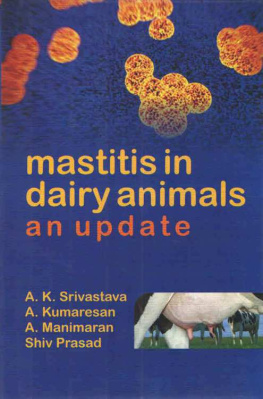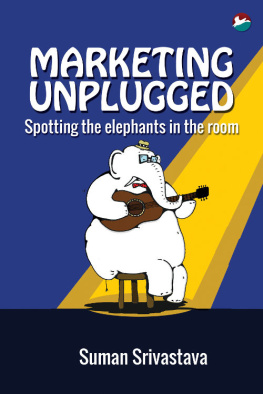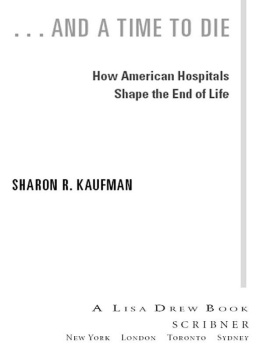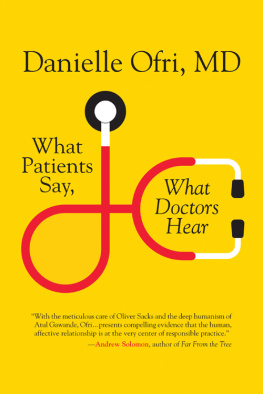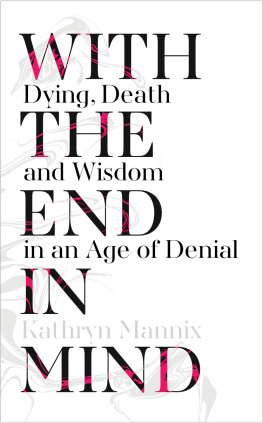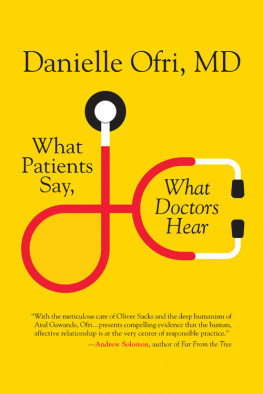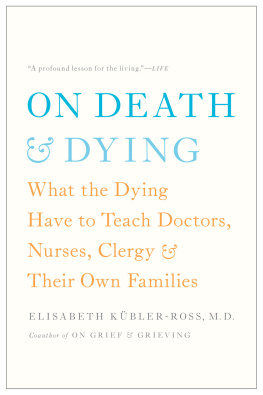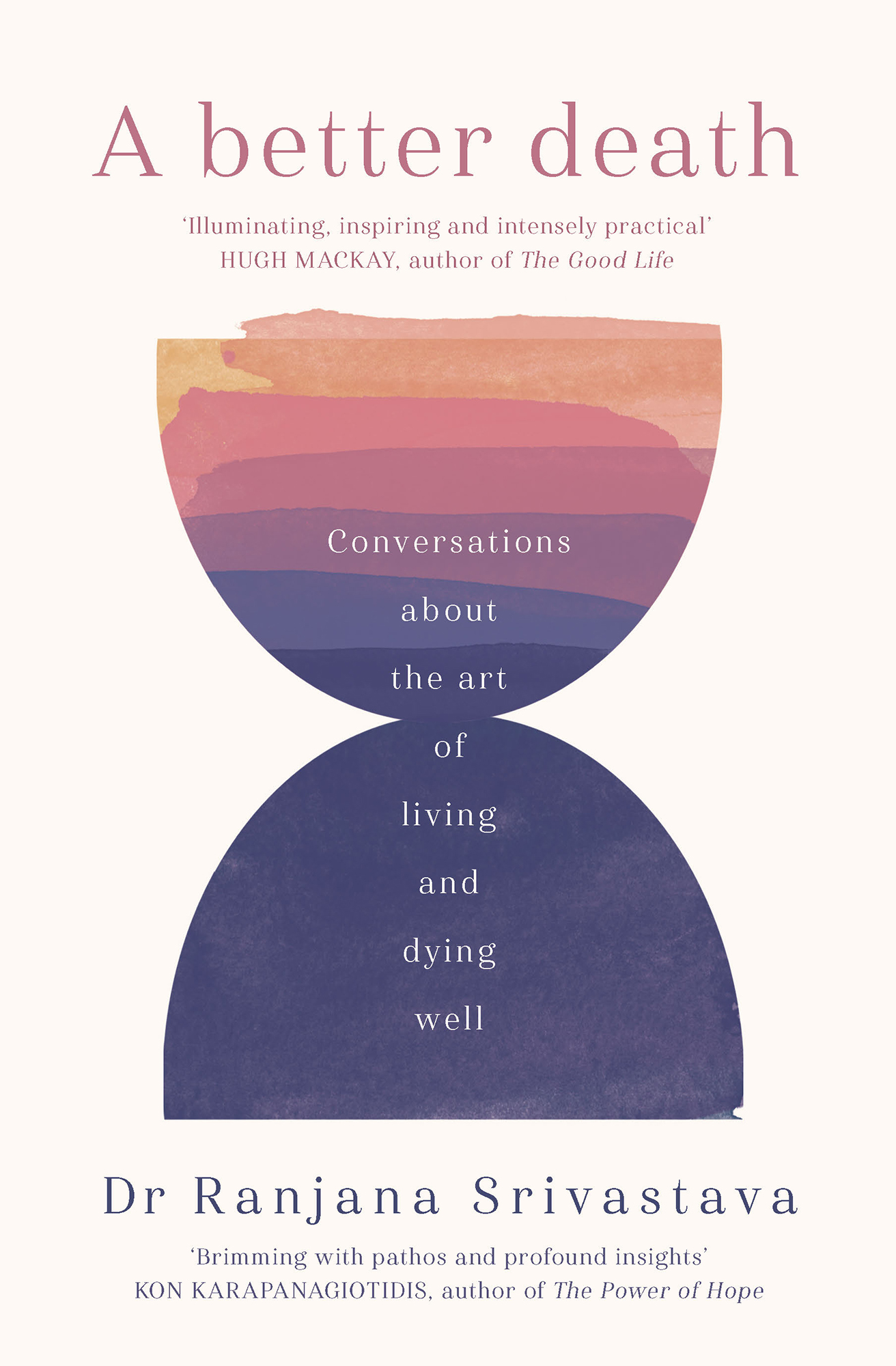Praise for A Better Death
Death is a subject most of us try to avoid, and all of us need to discuss. I cant imagine a better starting point for that conversation than Ranjana Srivastavas illuminating, inspiring and intensely practical book. The things we most want in a doctor kindness, compassion, empathy and the reassuring blend of technical skill and professional integrity are all here, shining through every word Hugh Mackay AO, author of The Good Life
A book brimming with pathos and profound insights on facing death with compassion, kindness and forgiveness, for ourselves and those we may be caring for who are dying. In helping us grapple with our own mortality, with unflinching honesty and pragmatism, Dr Srivastava empowers us to live our lives to the full with an urgency and authenticity that will transform all our lives for the better Kon Karapanagiotidis OAM, author of The Power of Hope
At last, a book to help us prepare for the end of life. With tremendous warmth and wisdom, Dr Srivastava is a compassionate guide there is comfort here, but also practical advice about the issues we will all face, and how to die with kindness, courage and perhaps, if we are lucky, grace Caroline Baum, author of Only
Equal parts moving and informative, this book will leave an indelible mark on anyone looking to cultivate meaning and purpose in life Australian Womens Weekly
Ranjana Srivastava is the wisest of doctors. A Better Death brings together a wealth of experience both as an oncologist and as a human being. Srivastava knows that death is far more than a clinical problem. It is the end point of a complex journey, and medicine is only one of the resources that the traveller might require. This book is alive to all the other needs such as friendship, honesty, purpose, touch, love and gratitude. Even a cup of tea. Dr Srivastava shares many stories from her work and does so in an uplifting and forthright manner. A Better Death exudes a calm and positive energy from every page. It is the perfect balm for a fearful and technocratic world. It celebrates the mystery of life Michael McGirr, author of Books that Saved My Life
Doctor Srivastava takes your hand in these pages, and leads you skilfully but gently along the road to the end of life. She lights that way vividly and with great thoroughness, as she knows it well, both by heart and by practice. You may be reluctant, but Dr Srivastava is irresistibly convincing and wise. Few among us will have the privilege of Dr Srivastava by our side, but this book is surely the next best thing Morag Zwartz, author of Being Sam
With her distinctive combination of empathy and vision, Dr Ranjana Srivastava has written an indispensable book full of warm and wise advice on how to care for those we love at the end of their lives. Further, she invites each of us to consider how we live now, and to think about our own mortality with a new and clear-eyed compassion. What a gift! Read it and give it to everyone you love Kate Richards, author of Madness: A Memoir
For my patients, who teach me
Ars longa, vita brevis
The art is long, life short.
Hippocrates
What I have learnt about dying well

I ENTERED MEDICAL SCHOOL with stars in my eyes. After all, doesnt everyone? Crossing the threshold of the cavernous lecture theatre for the first time, I dreamt of changing the world. The portraits of eminent clinicians that lined the corridors never seemed to me as distant things to be admired; rather, they were a living inspiration to earn the privilege of being a doctor.
Like so many young doctors, I was uncertain about my future. I met brilliant physicians and skilled surgeons who excelled in one area, but I always wondered whose job it was to embrace the whole of the patient, especially when things went downhill. Many times, I saw a laser-like focus on the disease dissipate to nothingness when the treatment failed. This happened especially when people were dying. It was often unintentional, but when a specialist slowly detached from dying patients and their families at a time when they most needed help to navigate what came next, it was really a form of abandonment. Consequently, the people who inspired me were those who chose to stay with patients to the end, who saw their duty in larger terms. They recognised that the end of treatment did not mean the end of care. They were good doctors but importantly, they were thoughtful people and I was moved by what powerful consolation they had to offer.
Since the earliest stages of my career, I was struck by how lonely the end of life could be. I met helpless patients and their loved ones who didnt know what to expect at the end of life. I noticed the strain of carers who bickered with each other and fought against their internal conflicts. But I also breathed the calm of patients who had made peace with dying and sensed the quiet determination of relatives joined by common purpose. I admiringly watched social workers deal with practical matters like paying off debts and recording a legacy and then finding time for existential questions that didnt have straightforward answers but nonetheless deserved attention: Why me? Why now?
I shouldnt have been surprised that one sentiment I repeatedly encountered was how much patients valued the kindness of their doctors. Dying patients and their relatives obviously appreciated the advocacy of their doctors in keeping them well but they reserved their most profound gratitude for those who cared for them and about them at the end of life.
The other crucial thing I learnt was how ill-equipped medicine is to help patients deal with the universal fact of life that is their death. Patients and caregivers described how difficult it was to get to the truth of an illness and how unprepared they felt to make major decisions about how far to go and what to do. For every patient who dismissed the need to talk about death and dying, there were many more who needed help to say the things they meant to say and do the things they longed to do.
Six years of medical school. Twelve more years of training. Eventually, I followed in the footsteps of a mentor to become a specialist in two areas: oncology and internal medicine.
Oncologists specialise in the diagnosis and management of cancer and possess detailed knowledge about cancer treatments, their relative merits, and their side effects.
Internal medicine physicians care for a broad range of patients such as those who have heart disease, stroke, diabetes, dementia, infections, chronic pain, lung disease and other chronic medical conditions. Nine out of ten people over the age of 65 have at least one common chronic condition and many patients consult a specialist for each organ. The most important role of an internal medicine physician is to avoid piecemeal medicine and provide a cohesive approach to the whole person.
My main work is as an oncologist. For three months each year, I also work as an internal medicine specialist. For two decades, I have worked in a public hospital located in one of the countrys most multicultural and also most socioeconomically depressed regions an area of high crime, entrenched poverty and crippling illiteracy. Practising medicine in this environment and effecting change is twice as hard. I have felt despondent, been threatened and robbed, yet I have never thought to leave. Because tucked away amongst these oppressive problems is something else: an unparalleled chance to learn not only the vagaries of medicine but importantly, how people from different corners of the world experience life and face death.


